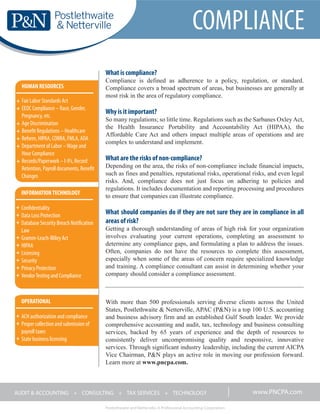Compliance
- 1. COMPLIANCE What is compliance? Compliance is defined as adherence to a policy, regulation, or standard. Compliance covers a broad spectrum of areas, but businesses are generally at most risk in the area of regulatory compliance. Why is it important? So many regulations; so little time. Regulations such as the Sarbanes Oxley Act, the Health Insurance Portability and Accountability Act (HIPAA), the Affordable Care Act and others impact multiple areas of operations and are complex to understand and implement. What are the risks of non-compliance? Depending on the area, the risks of non-compliance include financial impacts, such as fines and penalties, reputational risks, operational risks, and even legal risks. And, compliance does not just focus on adhering to policies and regulations. It includes documentation and reporting processing and procedures to ensure that companies can illustrate compliance. What should companies do if they are not sure they are in compliance in all areas of risk? Getting a thorough understanding of areas of high risk for your organization involves evaluating your current operations, completing an assessment to determine any compliance gaps, and formulating a plan to address the issues. Often, companies do not have the resources to complete this assessment, especially when some of the areas of concern require specialized knowledge and training. A compliance consultant can assist in determining whether your company should consider a compliance assessment. With more than 500 professionals serving diverse clients across the United States, Postlethwaite & Netterville, APAC (P&N) is a top 100 U.S. accounting and business advisory firm and an established Gulf South leader. We provide comprehensive accounting and audit, tax, technology and business consulting services, backed by 65 years of experience and the depth of resources to consistently deliver uncompromising quality and responsive, innovative services. Through significant industry leadership, including the current AICPA Vice Chairman, P&N plays an active role in moving our profession forward. Learn more at www.pncpa.com. Postlethwaite and Netterville, A Professional Accounting Corporation HUMAN RESOURCES Fair Labor Standards Act EEOC Compliance – Race, Gender, Pregnancy, etc. Age Discrimination Benefit Regulations – Healthcare Reform, HIPAA, COBRA, FMLA, ADA Department of Labor –Wage and Hour Compliance Records/Paperwork – I-9’s, Record Retention, Payroll documents, Benefit Changes AUDIT & ACCOUNTING + CONSULTING + TAX SERVICES + TECHNOLOGY www.PNCPA.com + + + + + + + INFORMATIONTECHNOLOGY Confidentiality Data Loss Protection Database Security Breach Notification Law Gramm-Leach-Bliley Act HIPAA Licensing Security Privacy Protection VendorTesting and Compliance + + + + + + + + + OPERATIONAL ACH authorization and compliance Proper collection and submission of payroll taxes State business licensing + + +

